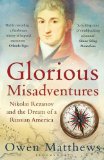Summary | Excerpt | Reviews | Beyond the Book | Readalikes | Genres & Themes | Author Bio

Nikolai Rezanov and the Dream of a Russian America
by Owen Matthews
'Your Excellency perhaps may laugh at my far-reaching plans, but I am certain that they will prove exceedingly profitable ventures. If we had men and means even without any great sacrifice on the part of the treasury all this country could be made a corporeal part of the Russian Empire,' Rezanov wrote to his patron the minister of commerce after his return from California in 1806. 'Not through petty enterprise but by great undertakings have mighty commercial bodies achieved rank and power.'
The betrothal of Rezanov and Conchita Arguello on the shores of the Pacific marked the closing of a circle. The Spanish and the Russian empires had been working their way towards each other since the late fifteenth century. Spain had sent its conquistadors west to the New World of the Americas; Russia had dispatched Cossack adventurers east into the wildernesses of north Asia. The Spaniard Vasco Núñez de Balboa was the first Westerner to set eyes on the Pacific Ocean, crossing the Isthmus of Panama in 1513. One hundred and twenty years later the Russian fur trapper Ivan Moskvitin crested the ridge of the Okhotsk Mountains and gazed eastwards at the same ocean. American gold fuelled a century of Spain's European wars and the glory of the court of Madrid, while Siberia's 'soft gold' – fur – paid for campaigns against the Swedes, Turks and Tatars as the Russians carved themselves an empire and a place on the European stage. And now the two empires had finally met, with the hungry Russians regarding the fat and ill-defended Spanish lands of California with greedy eyes.
Of the two fledgling European colonies on America's northern Pacific coast at the dawn of the nineteenth century, it was New Archangel, not San Francisco, which was the more populous and better defended. Ships were built on New Archangel's slipways and Boston traders regularly stopped in for news and supplies. Spanish San Francisco, in comparison, had a garrison of just forty soldiers and no docks when Rezanov visited in 1806. The Spanish governor of Nueva California told Rezanov that 'the Spanish Court feared Russia above all the other powers'.
For Rezanov, not to seize the territory would be a crime against posterity. 'If we allow it to slip through our fingers, what will succeeding generations say?' he wrote. 'I, at least, shall not be arraigned before them in judgement.'
Any historian who sets out to search for a hero will almost inevitably uncover something of the scoundrel. Heroism, it seems, is visible only through a long lens. And so it was with Rezanov. I followed the man's shade from the boulevards and palaces of St Petersburg to the squat rain-dripping counting houses of Pskov, where he passed a dreary provincial apprenticeship. Travelling by train, coal truck and bouncing Lada, I tracked him from the Siberian city of Irkutsk, once the capital of Russia's wild east, into the land of the Buryats and to the borders of China. I crunched along the black sand beaches of Petropavlovsk in Kamchatka and the black sand beaches of Kodiak Island, Alaska, at opposite ends of the Pacific. I stood in the remains of the presidio where Rezanov had danced with Conchita and shivered in the rain on the windy outcrop known as Castle Rock in Sitka, once the citadel of New Archangel, where he had spent the cold, hungry winter of 1805–6. And I spent hours – many hours, since Rezanov was a bureaucrat, a courtier and an ambassador who wrote something almost every day of his life – in the company of the reports, diaries and letters in which Rezanov described his ideas and circumstances voluminously, but his feelings only barely. It is only in the last three years of his life, far from home and viciously bullied by the officers of the round-the-world voyage he believed he was commanding, that the man himself begins to emerge from the officialese, indignant and in pain.
Excerpted from Glorious Misadventures by Owen Matthews. Copyright © 2013 by Owen Matthews. Excerpted by permission of Bloomsbury USA. All rights reserved. No part of this excerpt may be reproduced or reprinted without permission in writing from the publisher.
Your guide toexceptional books
BookBrowse seeks out and recommends the best in contemporary fiction and nonfiction—books that not only engage and entertain but also deepen our understanding of ourselves and the world around us.